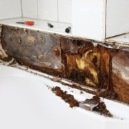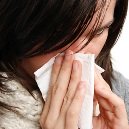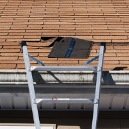Find a pre-screened local mold removal specialist Free Estimate
Find a Mold Specialist Now
Click or Call, Toll-Free 24/7
Hearing Loss From
Indoor Mold Exposure
Exposure to mold in the home can cause ear infections which sometimes lead to hearing loss. Often it’s just a temporary problem, resolving once the infection clears up, but severe infections can sometimes lead to permanent damage to hearing. Ear infections and sinus infections can also cause things like ringing in the ears.
Ear Infections Caused by Mold Exposure

Exposure to mold can cause fungal infections of the ear. Other mold-related respiratory infections may interfere with hearing, as well. For instance, if you have a sinus infection or a severe throat infection, your ears may feel “stopped up” and you may not be able to hear as well as you normally do. The ears, nose and throat are all connected so an infection in any of those areas can affect hearing.
Most of the time, once an infection has cleared up, you will be able to hear normally again. Sometimes, however, a severe ear infection can cause the eardrum to rupture or can otherwise cause permanent damage to your hearing.
Tinnitus
This is a condition in which you hear a sound, like ringing or buzzing or hissing, when there is no external sound present. It doesn’t mean you are hallucinating or “hearing things” and it is not a sign of a mental illness. Sometimes doctors don’t know what causes it but other times it can be caused by something like a sinus infection that affects the pressure in the middle ear, according to the American Tinnitus Association (ATA). The ringing or buzzing itself is not caused by mold, but mold can cause infections that then lead to the changes in pressure in the ear that cause the sounds.
In some cases, the phantom noise is so loud it interferes with hearing. In other cases, it does not affect hearing but can still be extremely bothersome.
Talking to Your Doctor About Hearing Loss
Age-related hearing loss generally occurs gradually over time so people are not always aware they are losing their hearing, at least initially. Loss of hearing related to ear infections usually develops much more quickly and is usually quite apparent. In either case, you should talk to your doctor if you notice any of the following:
- You can’t hear as well as you used to
- You have to ask people to repeat things frequently
- You have to turn the television up louder than usual
- You have trouble following a conversation if there is a lot of background noise
- You have trouble understanding people when talking on the phone
- You experience a ringing sensation in one or both ears, or hear buzzing, hissing, roaring or clicking sounds in one or both ears
- People ask you if you’re having trouble hearing, comment on the volume of your television, or tell you that you are speaking too loudly
Your doctor will ask you questions about your hearing and ask about any other symptoms you may be experiencing. Your doctor will also examine your ears with an otoscope. Be sure to tell your doctor about any other symptoms you have been experiencing, including pain in your ears, headache, fever, sinus pain or pressure, a stuffy nose, a cough, dizziness or fatigue. Also let your doctor know if you’ve been exposed to mold.
Your doctor may refer you to an otolaryngologist, sometimes referred to as an ENT, or an ear, nose and throat specialist. You may also be referred to an audiologist who can test your hearing.
If you have an ear infection, it may need to be treated with antibiotics. You may also need antibiotics for a sinus infection or other respiratory illness, as well as decongestants or other medications.
If an infection has been affecting your hearing, your hearing may return to normal after the infection clears up. However, in some cases, permanent hearing loss may occur. If that is the case, your doctor may refer you to be fitted for a hearing aid.
Eliminating Exposure to Mold
If mold exposure has triggered a respiratory or ear infection that has affected your hearing, you should know that even with medical treatment, you may not recover if you continue to be exposed to mold. If mold in your home is making you sick, it is recommended that you arrange to have someone else handle the mold removal for you so that you are not further exposed. You can schedule a free consultation with a mold removal professional to discuss your options. Follow this link to find experienced mold removal professionals offering free consultations in your area.
Free Home Inspection By A Mold Removal Specialist
Search This Website
Recent Articles
-
See Our 5 Recommended Mold Removal Companies in Covington, KY
Apr 16, 25 12:59 PM
-
See Our 5 Recommended Mold Removal Companies in Wheaton, IL
Jun 20, 24 10:33 AM
-
See Our 5 Recommended Mold Removal Companies in Aberdeen, SD
Oct 08, 21 04:05 PM




